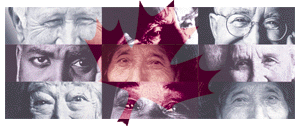 Gail Elliot, MA
Gail Elliot, MA
McMaster University
Office of Gerontological Studies
Canada consists of over 100 ethnocultural groups. The 65+ age group is comprised of a population that largely identifies with an ethnic origin other than Canadian.1 Research has too often documented that the health care practices in this country are ethnocentric, focusing on westernized, scientific based practices that too often ignore the alternative methods of care and cure.2,3,4
In a multicultural country such as Canada, cultural sensitivity should be intricately woven throughout all interactions in the health and social service delivery system. Not only should cultural sensitivity be considered for the purpose of providing patient-centred care, it must also be recognized that this country as a whole has adopted statutory and constitutional policy, and regulations that are intended to place "equality for all" at the forefront of individual rights and freedoms. In fact, Canada has spent nearly thirty years developing policies that are designed to encourage "all of us to work together to build a society in which the principles of multiculturalism are fully realized in practice.

 Gail Elliot, MA
Gail Elliot, MA